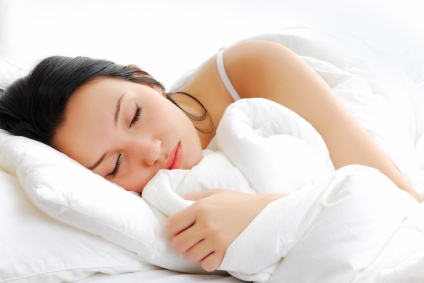Women are More Likely Than Men to Have Trouble Falling and Staying Asleep
Sleep is a basic human need, as important for good health as diet and exercise. When we sleep, our bodies rest but our brains are active. Sleep lays the groundwork for a productive day ahead. Although most people need seven to nine hours of sleep each night to function well the next day, the National Sleep Foundation (NSF) 1998 Women and SleepPoll found that the average woman aged 30-60 sleeps only six hours and forty-one minutes during the workweek.
A more recent 2005 NSF Sleep in America poll of all adults revealed that women are more likely than men to have difficulty falling and staying asleep and to experience more daytime sleepiness at least a few nights/days a week. Research has shown that too little sleep results in daytime sleepiness, increased accidents, problems concentrating, poor performance on the job and in school, and possibly, increased sickness and weight gain.
Getting the right amount of sleep is vital, but just as important is the quality of your sleep. Biological conditions unique to women, like the menstrual cycle, pregnancy and menopause, can affect how well a woman sleeps. This is because the changing levels of hormones that a woman experiences throughout the month and over her lifetime, like estrogen and progesterone, have an impact on sleep. Understanding the effects of these hormones, environmental factors and lifestyle habits can help women enjoy a good night’s sleep.
63% of Women Experience Insomnia
Insomnia is the most common sleep problem. Women are more likely than men to report insomnia. In fact, according to the 2002 NSF Sleep in America poll, more women than men experience symptoms of insomnia at least a few nights a week (63% vs. 54%) and they are more likely to have daytime sleepiness. Sometimes, women begin to have sleepless nights associated with menstruation, pregnancy or menopause and find it difficult to break poor sleep habits. Fortunately, there are a number of approaches to improving sleep:
- Establish regular bed and wake times.
- Change your diet; decrease the amount of caffeine or alcohol consumed. Eat at least four hours or more before bedtime, not right before.
- Stay away from caffeine and alcohol right before sleep time.
- Improve your sleep environment. Remove computers and televisions from your bedroom, make sure you have room darkening-blinds or draperies. Even the color of your room can affect your sleep.
- Exercise in the morning: One recent study found that overweight, post-menopausal women who exercise in the morning experience less difficulty falling asleep and better quality sleep than evening exercisers.
If insomnia persists, and lifestyle, behavioral or diet changes do not help, a doctor may prescribe a sleep-promoting medication (hypnotic). In some instances, there may be an underlying and treatable cause, such as depression (women are twice as likely to report depression as men), stress, anxiety, reflux, bladder problems or pain. Doctors may prescribe antidepressants (for depression), anxiolytics (anti-anxiety drugs), medications for heartburn, incontinence or pain and/or hypnotic medications to improve sleep.
About Valley Sleep Center
Since 2002, Valley Sleep Center has provided Arizona with diagnostic sleep disorder testing in a home-like atmosphere, ensuring a comfortable, relaxing experience for patients. Their physicians are Board Certified Sleep Medicine Specialists and they are accredited by the American Academy of Sleep Medicine. They provide diagnostic testing for a multitude of sleep related disorders including insomnia, sleep apnea, snoring, excessive daytime sleepiness, hypertension, sleepwalking, and pediatric sleep problems.
For more information contact Lauri Leadley at 480-830-3900 or visit www.valleysleepcenter.com.
To Comment


